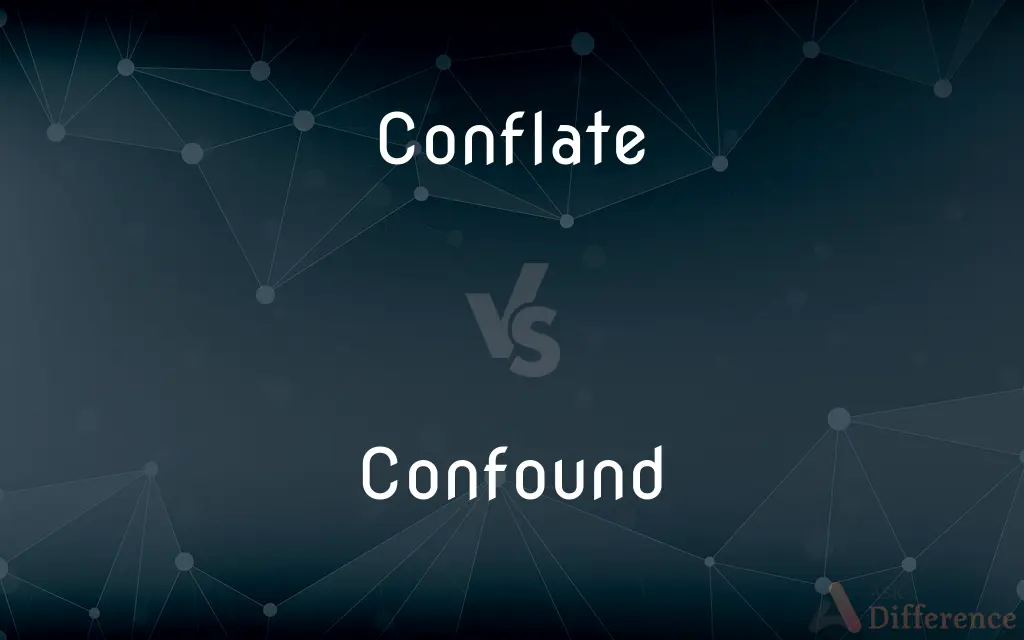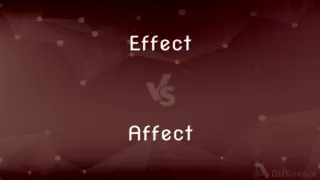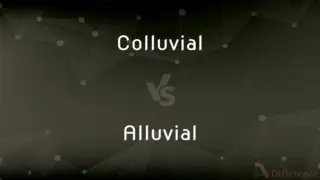Conflate vs. Confound — What's the Difference?
By Tayyaba Rehman & Urooj Arif — Updated on April 1, 2024
Conflate refers to the blending or merging of two or more distinct entities or ideas into one, while confound is to cause confusion or astonishment, often leading to an inability to distinguish differences.

Difference Between Conflate and Confound
Table of Contents
ADVERTISEMENT
Key Differences
Conflating involves combining two or more elements, ideas, or concepts, so they are treated as a single entity. This can occur in discussions or analyses where distinctions between the elements are ignored or overlooked, intentionally or not. For instance, conflating facts with opinions in an argument can lead to misleading conclusions. On the other hand, to confound someone is to perplex or bewilder them, making it difficult for them to understand or differentiate between things. Confounding can occur in situations where information is complex or contradictory, such as a confounding variable in a scientific study that makes it hard to establish a clear cause and effect.
Conflation can sometimes result from a lack of knowledge or awareness, where the individual genuinely does not recognize the distinctions between the concepts or items they are merging. It's a cognitive process that simplifies complex information by grouping it together. Confounding, however, often has to do with the external presentation of information or circumstances that introduce confusion or mix-up elements in a way that complicates understanding or analysis.
The act of conflating is not always negative; it can be used deliberately in rhetorical strategies to make a point or argument more persuasive. However, it risks oversimplification or misunderstanding of the subjects at hand. Confounding, particularly in scientific and statistical contexts, is generally seen as a hurdle to clear understanding and accurate interpretation. Researchers strive to identify and control for confounding variables to maintain the integrity of their findings.
In everyday language, conflating is commonly seen in discussions where nuanced differences between ideas or categories are glossed over. For example, conflating love and infatuation, though related, overlooks significant differences between the two feelings. In contrast, confounding is used to describe situations, results, or phenomena that are surprising or difficult to comprehend, often because they go against expected patterns or introduce unexpected complexity, like confounding expectations by acting against the norm.
The key difference lies in their usage and implications: conflating typically deals with the process of blending or merging, often simplifying or obscuring complexities, whereas confounding is about creating confusion, complexity, or astonishment, often complicating understanding.
ADVERTISEMENT
Comparison Chart
Definition
To blend or merge two or more entities into one.
To cause confusion or astonishment, making distinctions unclear.
Context
Often used in discussions or analysis.
Common in scientific, statistical, and everyday contexts.
Implication
Can lead to oversimplification or misunderstanding.
Introduces complexity or surprises, complicating understanding.
Example
Conflating facts with opinions in arguments.
A confounding variable in research obscures clear causation.
Outcome
Simplification by merging distinctions.
Increased complexity or confusion due to unexpected factors.
Compare with Definitions
Conflate
Merging concepts or categories.
People often conflate happiness with material success.
Confound
Surprising or going against expectations.
Her decision confounded her family, who expected her to choose differently.
Conflate
Ignoring differences.
The discussion conflated the symptoms of colds and allergies, which are distinct.
Confound
Causing confusion or astonishment.
The magician's trick confounded the audience, leaving them puzzled.
Conflate
Blending distinct ideas into one.
Conflating love and dependency can lead to unhealthy relationships.
Confound
Making distinctions unclear.
The twins' identical looks often confound their teachers.
Conflate
Simplification through combination.
The narrative conflates multiple historical events into a single storyline.
Confound
Introducing complexity.
The unexpected results of the experiment confounded the scientists.
Conflate
Used in rhetorical strategies.
Politicians sometimes conflate issues to appeal to broader audiences.
Confound
Complicating understanding or analysis.
The sudden change in weather patterns has confounded experts.
Conflate
Combine (two or more sets of information, texts, ideas, etc.) into one
The urban crisis conflates a number of different economic, political, and social issues
Confound
Cause surprise or confusion in (someone), especially by not according with their expectations
The inflation figure confounded economic analysts
Conflate
To bring together; meld or fuse
"The problems [with the biopic] include ... dates moved around, lovers deleted, many characters conflated into one" (Ty Burr).
Confound
Mix up (something) with something else
He was forever confounding managerialism with idealism
Conflate
To combine (two variant texts, for example) into one whole.
Confound
Used to express anger or annoyance
Oh confound it, where is the thing?
Conflate
To fail to distinguish between; confuse. See Usage Note below.
Confound
To cause to become confused or perplexed.
Conflate
To bring (things) together and fuse (them) into a single entity.
Confound
To fail to distinguish; mix up
Don't confound fiction and fact.
Conflate
To mix together different elements.
Confound
To make (something bad) worse
Do not confound the problem by losing your temper.
Conflate
(by extension) To fail to properly distinguish or keep separate (things); to mistakenly treat (them) as equivalent.
“Bacon was Lord Chancellor of England and the first European to experiment with gunpowder.” — “No, you are conflating Francis Bacon and Roger Bacon.”
Confound
To cause to be ashamed; abash
An invention that confounded the skeptics.
Conflate
Combining elements from multiple versions of the same text.
Confound
Used in mild curses
Confound you!.
Conflate
(biblical criticism) A conflate text, one which conflates multiple version of a text together.
Confound
To frustrate or thwart
Trivial demands that confounded the peace talks.
Conflate
To blow together; to bring together; to collect; to fuse together; to join or weld; to consolidate.
The State-General, created and conflated by the passionate effort of the whole nation.
Confound
(Archaic) To defeat or overthrow (an enemy).
Conflate
To ignore distinctions between, by treating two or more distinguishable objects or ideas as one; to confuse.
Confound
To perplex or puzzle.
Conflate
Mix together different elements;
The colors blend well
Confound
To stun or amaze.
Confound
To fail to see the difference; to mix up; to confuse right and wrong.
Confound
To make something worse.
Don't confound the situation by yelling.
Confound
To combine in a confused fashion; to mingle so as to make the parts indistinguishable.
Confound
To cause to be ashamed; to abash.
His actions confounded the skeptics.
Confound
To defeat, to frustrate, to thwart.
Confound
(dated) To damn (a mild oath).
Confound you!
Confound the lady!
Confound
(archaic) To destroy, ruin, or devastate; to bring to ruination.
Confound
(statistics) A confounding variable.
Confound
To mingle and blend, so that different elements can not be distinguished; to confuse.
They who strip not ideas from the marks men use for them, but confound them with words, must have endless dispute.
Let us go down, and there confound their language.
Confound
To mistake for another; to identify falsely.
They [the tinkers] were generally vagrants and pilferers, and were often confounded with the gypsies.
Confound
To throw into confusion or disorder; to perplex; to strike with amazement; to dismay.
The gods confound...The Athenians both within and out that wall.
They trusted in thee and were not confounded.
So spake the Son of God, and Satan stoodA while as mute, confounded what to say.
Confound
To destroy; to ruin; to waste.
One man's lust these many lives confounds.
How couldst thou in a mile confound an hour?
Confound
Be confusing or perplexing to; cause to be unable to think clearly;
These questions confuse even the experts
This question completely threw me
This question befuddled even the teacher
Confound
Mistake one thing for another;
You are confusing me with the other candidate
I mistook her for the secretary
Common Curiosities
What does it mean to conflate two arguments?
To conflate two arguments means to blend or merge them into a single argument, possibly ignoring their distinct aspects.
How can researchers avoid confounding in their studies?
Researchers can avoid confounding by carefully designing their studies to control for potential confounding variables, through strategies like randomization and stratification.
Can the terms conflate and confound be used interchangeably?
No, while both involve blending or mixing concepts, conflate specifically refers to merging, often simplifying, while confound refers to causing confusion or complexity.
What is an example of a confounding factor in public health research?
An example would be socioeconomic status in a study on diet and health outcomes, where it could independently affect both diet choices and health, making relationships harder to interpret.
How does confounding impact statistical analysis?
Confounding complicates statistical analysis by mixing effects of different variables, making it challenging to determine the true relationship between variables of interest.
What is a common result of conflating ideas in a discussion?
A common result is the blurring of important distinctions, which can lead to misunderstanding or acceptance of flawed arguments.
Why is it important to distinguish between conflate and confound?
Distinguishing between them is crucial for clear communication and understanding, especially in academic, scientific, and analytical contexts, where precision is vital.
Can a confounding variable affect the outcome of an experiment?
Yes, a confounding variable can significantly affect the outcome by introducing additional, unforeseen complexity, making it hard to interpret the results accurately.
Is conflating concepts always a mistake?
Not always; it can be a deliberate rhetorical strategy, though it risks oversimplification or misunderstanding.
Can something be both conflating and confounding in its effect?
Yes, a statement or theory could conflate two ideas, thus simplifying them, and also confound the audience by making the differences between those ideas less clear.
Share Your Discovery

Previous Comparison
Effect vs. Affect
Next Comparison
Colluvial vs. AlluvialAuthor Spotlight
Written by
Tayyaba RehmanTayyaba Rehman is a distinguished writer, currently serving as a primary contributor to askdifference.com. As a researcher in semantics and etymology, Tayyaba's passion for the complexity of languages and their distinctions has found a perfect home on the platform. Tayyaba delves into the intricacies of language, distinguishing between commonly confused words and phrases, thereby providing clarity for readers worldwide.
Co-written by
Urooj ArifUrooj is a skilled content writer at Ask Difference, known for her exceptional ability to simplify complex topics into engaging and informative content. With a passion for research and a flair for clear, concise writing, she consistently delivers articles that resonate with our diverse audience.
















































